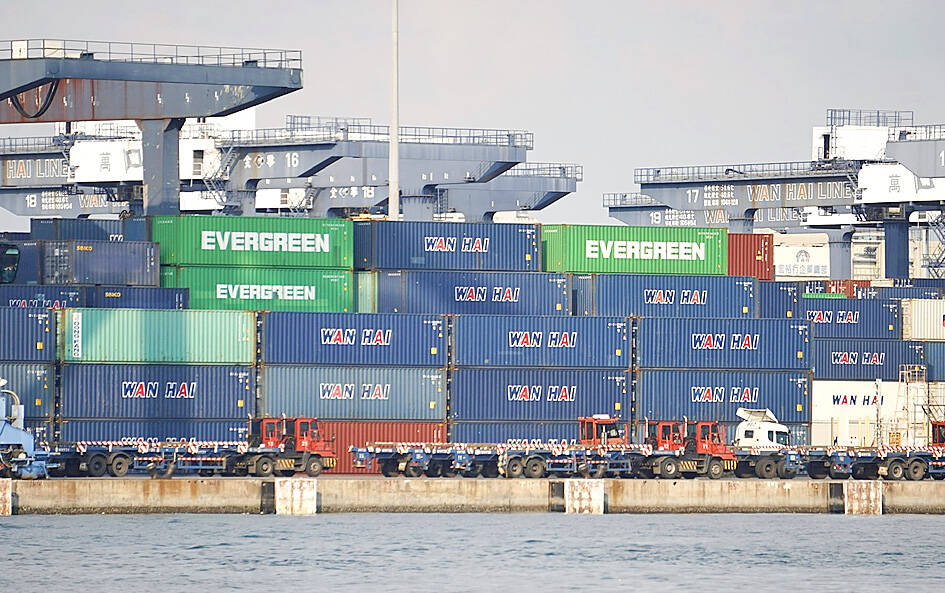Taiwan’s exports to Mexico surged to a record level as tech companies moved production out of China, but the trade now faces uncertainty following US threats of higher tariffs on its neighbor.
Taiwanese exports to Mexico jumped 479 percent last month from a year earlier to reach US$2.7 billion, official data showed. This is mainly driven by shipments of graphic processing units, a key components of artificial intelligence (AI) servers.
The Ministry of Finance in a statement on Friday said the surge was largely due to supply chain shifts, as companies like Hon Hai Precision Industry Co (鴻海精密) — also known as Foxconn Technology Group (富士康科技集團) — and Wistron Corp (緯創) have been building factories in Mexico to assemble AI servers destined for the US.

Photo: CNA
The trade now seems at risk after US President Donald Trump announced late last month that he would impose 25 percent tariffs on imports from Mexico and Canada. The decision was later delayed for 30 days after last-minute negotiations, but the threats have caused stock prices of Taiwanese tech companies to plunge.
Last month, Trump also announced plans to impose 100 percent tariffs on computer chips from Taiwan. Minister of Economic Affair J.W. Kuo (郭智輝) on Saturday said that a group of officials would travel to the US to meet with Trump administration officials to try and stop the tariffs from being implemented.
In addition, Taiwan is preparing to buy more liquefied natural gas (LNG) from the US to reduce its trade surplus and potentially avoid higher tariffs.
State-owned CPC Corp, Taiwan (CPC, 台灣中油) and the ministry are in negotiations with an Alaska-based export plant for supplies, state-run Central News Agency reported on Sunday, citing an unidentified ministry official.
Trump on Friday said Japan would buy a record volume of US LNG, following a meeting with Japanese Prime Minister Shigeru Ishiba at the White House.
Last year, Taiwan imported about 10 percent of its LNG from the US, with most shipments arriving from Australia and Qatar under long-term supply contracts, official data showed.

Taiwan will prioritize the development of silicon photonics by taking advantage of its strength in the semiconductor industry to build another shield to protect the local economy, National Development Council (NDC) Minister Paul Liu (劉鏡清) said yesterday. Speaking at a meeting of the legislature’s Economics Committee, Liu said Taiwan already has the artificial intelligence (AI) industry as a shield, after the semiconductor industry, to safeguard the country, and is looking at new unique fields to build more economic shields. While Taiwan will further strengthen its existing shields, over the longer term, the country is determined to focus on such potential segments as

UNCERTAINTY: Innolux activated a stringent supply chain management mechanism, as it did during the COVID-19 pandemic, to ensure optimal inventory levels for customers Flat-panel display makers AUO Corp (友達) and Innolux Corp (群創) yesterday said that about 12 to 20 percent of their display business is at risk of potential US tariffs and that they would relocate production or shipment destinations to mitigate the levies’ effects. US tariffs would have a direct impact of US$200 million on AUO’s revenue, company chairman Paul Peng (彭雙浪) told reporters on the sidelines of the Touch Taiwan trade show in Taipei yesterday. That would make up about 12 percent of the company’s overall revenue. To cope with the tariff uncertainty, AUO plans to allocate its production to manufacturing facilities in

COLLABORATION: Given Taiwan’s key position in global supply chains, the US firm is discussing strategies with local partners and clients to deal with global uncertainties Advanced Micro Devices Inc (AMD) yesterday said it is meeting with local ecosystem partners, including Taiwan Semiconductor Manufacturing Co (TSMC, 台積電), to discuss strategies, including long-term manufacturing, to navigate uncertainties such as US tariffs, as Taiwan occupies an important position in global supply chains. AMD chief executive officer Lisa Su (蘇姿丰) told reporters that Taiwan is an important part of the chip designer’s ecosystem and she is discussing with partners and customers in Taiwan to forge strong collaborations on different areas during this critical period. AMD has just become the first artificial-intelligence (AI) server chip customer of TSMC to utilize its advanced

Chizuko Kimura has become the first female sushi chef in the world to win a Michelin star, fulfilling a promise she made to her dying husband to continue his legacy. The 54-year-old Japanese chef regained the Michelin star her late husband, Shunei Kimura, won three years ago for their Sushi Shunei restaurant in Paris. For Shunei Kimura, the star was a dream come true. However, the joy was short-lived. He died from cancer just three months later in June 2022. He was 65. The following year, the restaurant in the heart of Montmartre lost its star rating. Chizuko Kimura insisted that the new star is still down